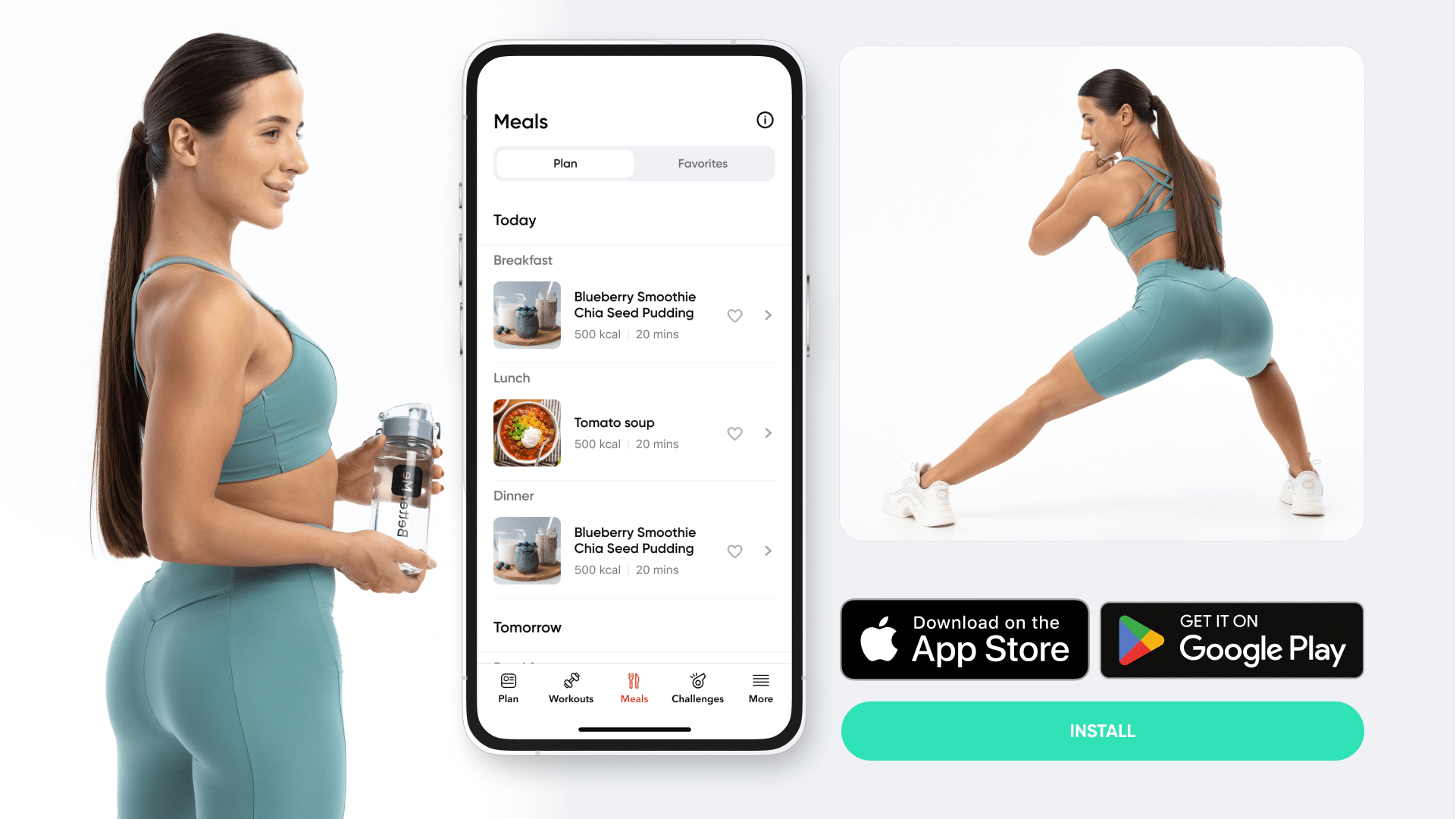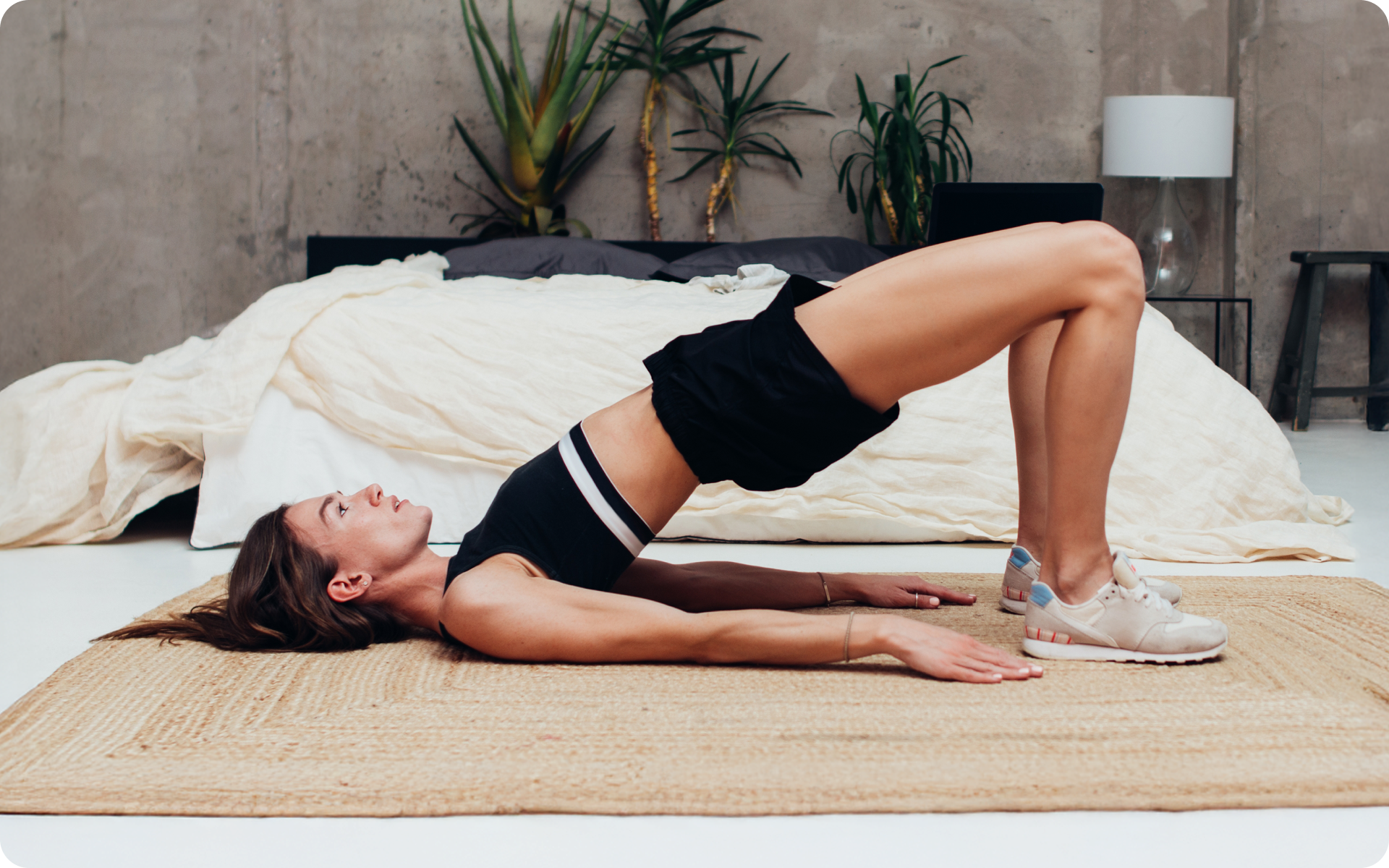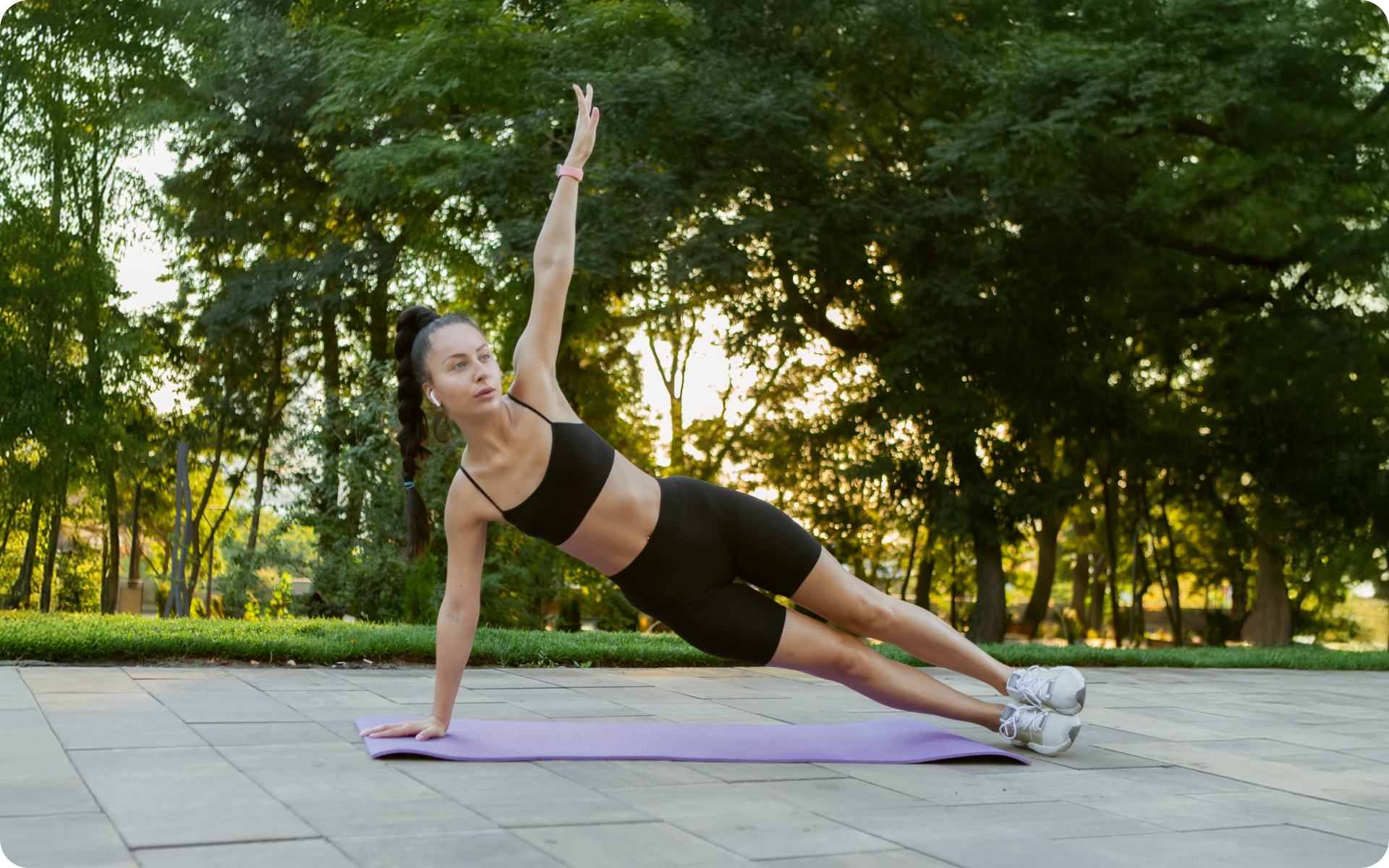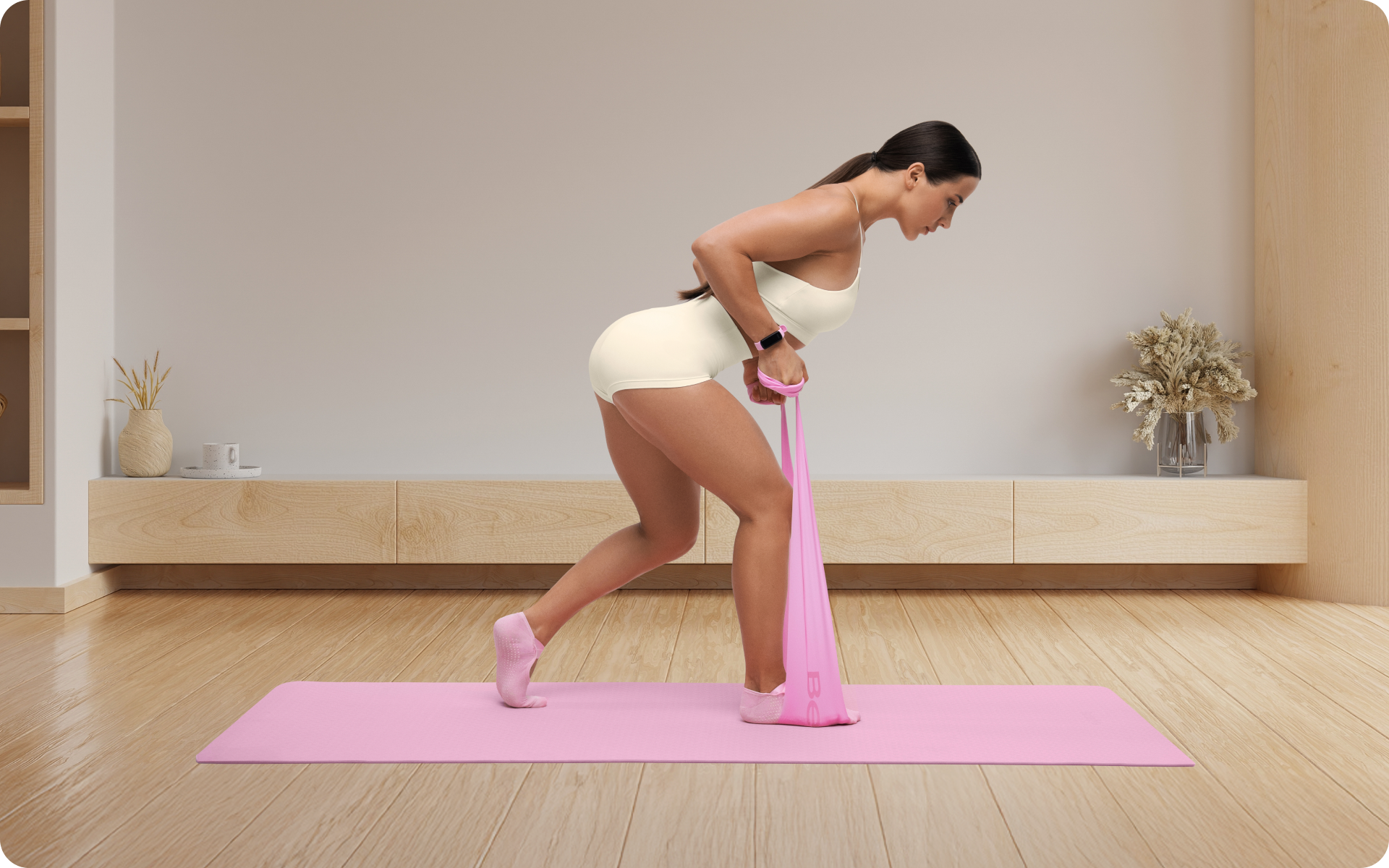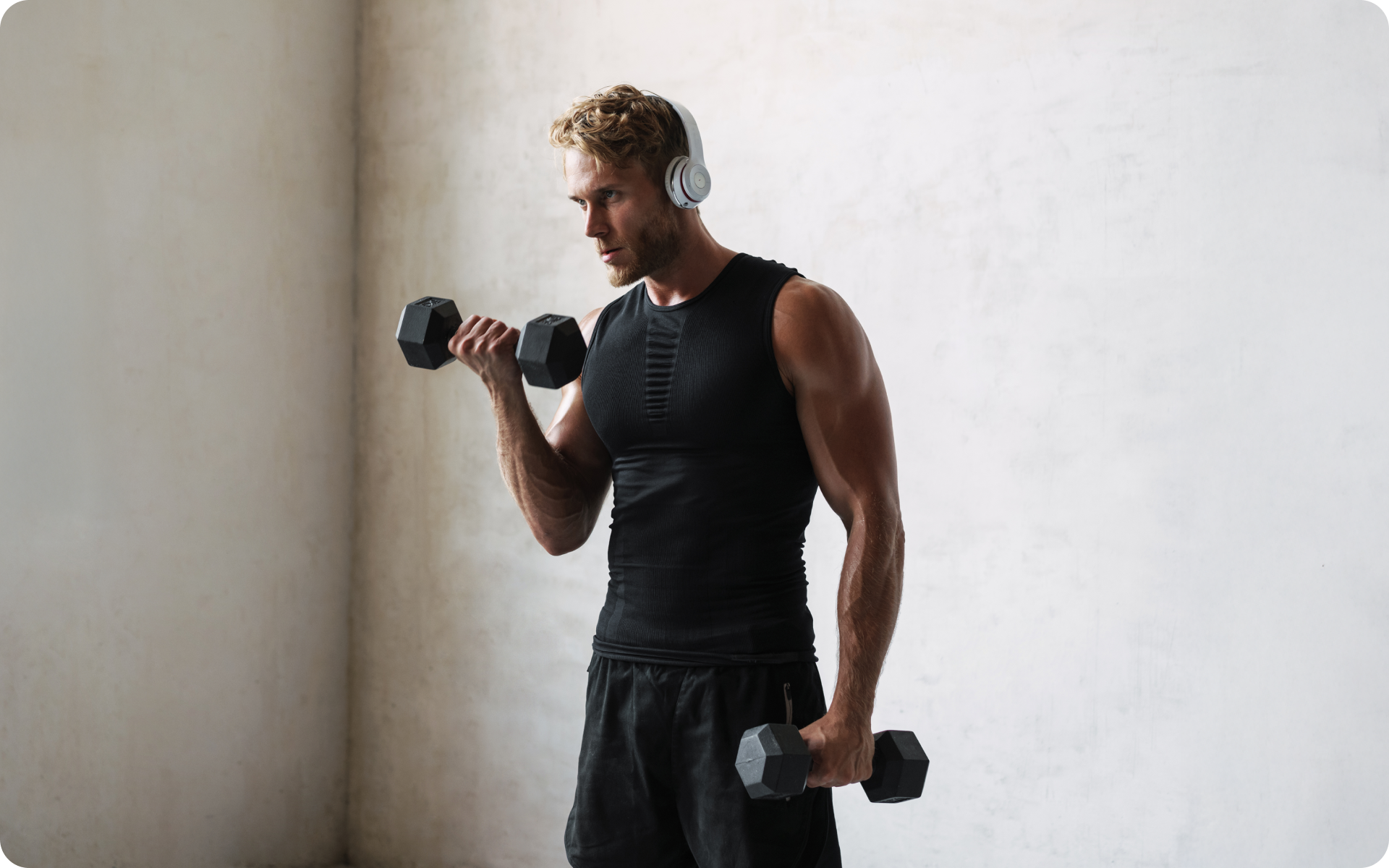Everyone wants that perfect, lean, and cut body, but how do you achieve that? The only sure way to get ripped is working out and eating right. However, not just any workout or meal plan will do.
Celebrities on Instagram, YouTube, and Facebook swear by extremely restrictive diets and workouts that are almost impossible to follow. However, experts say that your workout plan and meal plan should be tailored to maximize muscle build and fat loss.
Here’s a 1-month workout plan to get ripped in no time and everything else you need to know about how to lose fat.
Is it Possible to “Get Ripped” in 1 Month?
Getting ripped (or achieving a very low body fat percentage) in 1 month may be possible for some individuals, but it isn’t a realistic or sustainable goal for most people. It takes time, consistency, and dedication to achieve significant changes in body composition.
Body composition refers to the amount of muscle, fat, bone, and other tissues that make up our bodies (2). Various factors can affect an individual’s body composition:
- Genetics: Our genetic makeup plays a major role in determining our body composition.
- Diet: What we eat and how much we eat can greatly influence our body composition. A balanced and nutritious diet is essential for building muscle and losing fat.
- Exercise: Regular physical activity, particularly strength training, can help increase muscle mass and decrease body fat (17).
- Hormones: Hormonal imbalances or medical conditions can affect body composition and make it difficult to achieve certain fitness goals (10).
- Sleep: Adequate sleep is important for muscle recovery and growth, in addition to regulating hormones that control appetite and metabolism (20).
It may be possible for some individuals such as professional athletes or bodybuilders to achieve an incredibly low body fat percentage in 1 month, but it’s not a realistic or healthy goal for the average person. Here are some reasons why:
- You’d need to be in a significant calorie deficit: Losing fat requires being in a calorie deficit, which means burning more calories than you consume (13). This can be achieved through diet and exercise, but it takes time for the body to adjust and start shedding fat.
- Building muscle takes time: Gaining muscle requires consistent strength training and proper nutrition. It typically takes several weeks or months to see significant changes in muscle mass.
- It may not be sustainable: Extreme diets or intense workouts that promise quick results are often not sustainable in the long term. This can lead to burnout, injury, and ultimately regaining any weight that is initially lost.
- Individual differences: Everyone’s body is different and responds differently to diet and exercise. What may work for one person may not work for another, which makes it difficult to follow a one-size-fits-all approach to getting ripped.
Dropping pounds by the dozens without putting yourself through the wringer is everyone’s weight loss pipe dream. But what if we told you that the BetterMe app can make that happen? Keep yourself in prime shape with our fat-blasting workouts, delicious budget-sparing recipes, and body-transforming challenges with our app!
What Is the Best Workout Routine to Get Shredded?
To get shredded in a period as short as four weeks, you must perform a series of intense workouts. This will require you to strength train more and at a higher intensity and even crank up your cardio full-body workout routine.
Beginners may be worried about the time commitment and the high expectations, but there are several 1-month workout plans to get ripped that they can choose from.
The featured 1-month workout plan to get ripped incorporates strength training, cardiovascular (aerobic) exercises, and rest days.
We have a Calisthenics for Beginners workout guide that you may also find useful.
Strength Training
Strength training is the one sure way of building muscle. It helps you build strength and improve your performance (15).
Cardio Workout
Cardio is famed for being a fat-burning exercise. It is also associated with many health benefits, including decreased blood pressure, increased blood flow, decreased risk of stroke, and reduced age-related mental decline (7).
When strength training and cardio are combined with a healthy nutrition plan, these forms of exercise can help you build muscle and lose fat and weight in no time.
Unfortunately, working out is much harder than it seems, but that isn’t to say that it’s impossible. You need to be consistent, patient, and committed throughout the entire workout period.
Even on days when you’re totally unmotivated, you need to make sure you follow your workout and meal plans. Reminding yourself of the end goal – getting your dream body – may help keep you motivated.
You should keep in mind that you can modify this workout. For example, a 1-month workout plan to get ripped at home healthily will require you to do strength training and cardio exercises that can be performed at home with the equipment you have.
Workout Plan to Get Ripped in a Month
Below is what your 1-month workout plan to get ripped will look like:
Week 1
- Monday: Workout A
- Tuesday: Rest
- Wednesday: Workout B
- Thursday: Rest
- Friday: Workout C
- Saturday: Cardio (3 activities)
- Sunday: Rest
Week 2
- Monday: Workout A
- Tuesday: Rest
- Wednesday: Workout B
- Thursday: Rest
- Friday: Workout C
- Saturday: Cardio (3 activities)
- Sunday: Rest
Week 3
- Monday: Workout A
- Tuesday: Cardio
- Wednesday: Rest
- Thursday: Workout B
- Friday: Cardio (3 activities)
- Saturday: Workout C
- Sunday: Rest
Week 4
- Monday: Workout A
- Tuesday: Cardio
- Wednesday: Rest
- Thursday: Workout B
- Friday: Cardio (3 activities)
- Saturday: Workout C
- Sunday: Rest
You’ll need to go to the gym on selected days because some of the exercises require certain specialist equipment. For example, you’ll need to use a trap bar for the trap bar deadlift.
Other equipment you may need includes a pull-up bar, an adjustable cable machine, barbells, dumbbells, kettlebells, resistance bands, benches, and squat racks.
The cardio exercises can easily be done outside of a gym. Keep in mind that choosing to work out from home doesn’t mean you skip your workout. Try to keep yourself accountable and stay consistent throughout the workout duration, whether it’s weeks or months.
You may find that going to the gym is better as you get an instructor and can even bring along a workout buddy to help keep you motivated and accountable.
Remember to practice proper form and breathing techniques. Complete all the reps and sets as required. If you feel that the reps are too high initially, you can reduce them and then increase them gradually as you progress.
The workouts below include the following exercises:
Workout A
- Barbell front squat: 5 sets of 8 reps, 90 seconds rest
- Single-arm cable row: 5 sets of 8 reps, 60-90 seconds rest
- General push-up: 5 sets of 8 reps, 90 seconds rest
- Neutral-grip pull-up: 5 sets of 8 reps, 90 seconds – 2 minutes rest
- Barbell hip thrust on the floor: 5 sets of 8 reps, 2 minutes rest
- Band pull-apart: 3 sets of 10 reps, 30-60 seconds rest
- Ab wheel rollout: 2 sets of 10 reps, 60-90 seconds rest
- One-arm kettle farmer’s carry: 2 sets of 20 yards, 60 seconds rest (perform on the right arm then the left; you can also use dumbbells)
Workout B
- Trap bar deadlift: 8 sets of 6 reps, 2-3 minutes rest (you can do a conventional barbell deadlift on two sturdy 45-pound plates stacked flat on the ground instead)
- X-band walk: 8 sets of 10 reps, 60 seconds rest
- Dumbbell push press: 4 sets of 12-15 reps, 2-2.5minutes rest
- Chest supported row: 4 sets of 12-15 reps, 2 minutes rest
- Farmer’s walk: 4 sets each 30 seconds, 30-60 seconds rest
- Bear crawl: 3 sets each 20 seconds, 30-60 seconds rest
- Kettlebell waiter’s walk: 3 sets of 20 yards, 30-60 seconds rest
Workout C
- Dumbbell bench press: 5 sets of 5 reps, 2-2.5minutes rest
- Chinup: 8 sets of 5 reps, 2-2.5 minutes rest
- Dumbbell goblet lateral squat: 4 sets of 8 reps, 2-2.5 minutes rest
- TRX inverted row: 4 sets of 8 reps, 1-2 minutes rest
- Single-leg Romanian deadlift: 4 sets of 8 reps, 2 minutes rest
- Palloff press: 3 sets of 10 reps, 30-60 seconds rest
- Barbell bicep curl: 3 sets of 10 reps, 60 seconds rest
Cardio
On the cardio day, you can choose any three cardio activities. For every exercise, do five rounds of 30 seconds with 30 seconds of rest between rounds. You should also rest for three to five minutes between the different exercises.
- Sled push
- Treadmill push
- Airdyne bike
- Stationary rower
- Versaclimber
- Jumping jacks
- Burpees
- Sprints
Want to build an attention-grabbing bubble butt, blast away fat that’s stored in all the wrong places, spring-clean your diet, turn back the clock on your skin, skyrocket your self-confidence and shatter your insecurities? Check out the BetterMe app and set this plan in motion!
Meal Plan to Get Ripped
When choosing a meal plan, you must remember to consider these three things:
Your Daily Routine
How much time do you have on your hands? Do you work from home and have flexibility? Do you work at an office far from home and commute to work every morning?
It’s important to factor in your daily routine. Your workout plan should allow you to complete your day’s tasks and still get enough rest. Basically, it should not put stress on your daily routine and make it impossible to get anything else done.
Fitness Level
What is your fitness level? Do you work out often or not? Make sure you ask yourself these questions so you can choose a workout plan for your fitness level. If you’re a beginner, choose a workout plan that’s suitable for a beginner and not an advanced-level workout plan.
Your Fitness Goal
What is your goal in the long term? Do you want to lose weight just before a wedding? Do you want to lose fat or weight? Do you want to gain muscle?
Your goal will help you pick a workout that will help you achieve it. To get ripped, you need to pick a workout plan that will help you gain muscle and get rid of fat.
How to Get a Ripped Meal Plan
Your eating style is also important when it comes to getting lean and cut. Eating healthy, whole meals will help you achieve your goal in the long term. This means you may need to give up some of your favorite foods, but it will be worthwhile.
You may also need to cut your calorie consumption to lose fat. Your calorie consumption should be enough to meet your basic physiological requirements – it shouldn’t be so low that your body slows down its metabolism, which can interfere with weight loss efforts. Foods you need to eliminate include ultra-processed foods, fast foods, refined carbs (such as white bread) and white rice, and sugary foods (such as cakes, cookies, candies, carbonated drinks, and energy drinks).
Your meals should include all three macros – carbs, protein, and healthy fats.
Vegetables and fruits are also important as they supply many important micronutrients including vitamins D and E, zinc, iron, potassium, and magnesium. These nutrients promote muscle growth, improve performance and strength, and possess antioxidant properties (12) (16).
Regarding carbs, you need to make the right choice. Opt for complex carbs, such as whole grains, quinoa, brown rice, whole-wheat bread, lentils, peas, and oats.
Carbohydrates are the main source of energy in the body. Eating carbs replenishes the glycogen stores used up during your workout (8).
Protein remains the most crucial macronutrient when it comes to building muscle. Protein helps grow muscle mass, improve muscle strength, and preserve lean muscle (4).
So, you should aim for adequate protein distributed across your day. Lean protein sources include lean beef, skinless chicken, pork tenderloin, cheese, milk, Greek yogurt, tuna, salmon, legumes, nuts, and seafood.
You can also incorporate protein powder in your smoothies. Check out our post Protein Powder 101: Everything You Need to Know for more information.
Below are some sample meal plans:
Meal Plan 1
- Breakfast: 4 scrambled egg whites, 2 slices whole-grain bread, 50 g oats, and 1 glass milk
- Snack: Hummus on oatcakes and 2 apples
- Lunch: Turkey, Swiss cheese, and salad on whole-grain bread
- Snack: Chocolate protein shake and 2 pieces of citrus fruit
- Dinner: Stir-fried chicken, broccoli, and brown rice
Meal Plan 2
- Breakfast: 3 boiled eggs, sauteed spinach, 1 tomato, 2 bagels, and 1 glass fresh fruit juice
- Snack: Cottage cheese on 6 Ryvitas, 1 banana
- Lunch: Baked Irish potatoes, tuna, cheese, and a protein shake
- Snack: 1 whole-grain bagel, smoked salmon, cottage cheese, and a protein shake
- Dinner: brown rice and chicken and vegetable stir fry.
Read more: Counting Macros for Weight Loss: Pros, Cons, and How-To (A Beginner’s Guide)
Tips to Get the Most from Your 1-Month Workout Plan to Get Ripped at Home
Working out and adopting a healthier meal plan may be the key to getting ripped, but a few other things matter too. They may help you yield even better results from your workout plan.
Here are a few tips to help you get ripped:
Listen to Your Body
It might sound basic, but listening to your body is important. True, there will be days when you don’t feel like not working out because you’re unmotivated. There are also days when you’ll feel too exhausted.
If you get up and feel too exhausted or unwell, don’t force yourself to work out. And while it is okay to do a few extra sets, don’t push yourself too hard.
Hydrate
This cannot be emphasized enough. Water is essential for many functions in the body, including lubricating joints, eliminating toxins, optimal functioning of organs, thermoregulation, and moistening of tissues (22).
Water is also important in the recovery of muscles. An interesting water fact is that approximately 76% of muscle mass is water (21). You may also benefit from drinking electrolyte-rich drinks.
Get Enough Rest
You may be tempted to work out seven days a week, do as many reps as possible, and reduce the rest intervals between sets to maximize the benefits of your workout, but this is counterproductive.
When you train too much without adequate recovery, you may develop a syndrome that is referred to as overtraining syndrome. It is characterized by severe burnout and often leads to underperformance (3) (14).
When working out to get ripped, you don’t want to suffer from constant fatigue, muscle soreness, and frequent illness as this will derail your progress. Overtraining also increases your chance of injury (14).
So make sure to sleep at least 7 to 9 hours every night, have rest days, and rest in between sets.
Try Carb Cycling
Carb cycling refers to matching your carb intake with your activity level for each day. On intense workout days, you eat high-carb meals, while on rest days on less intense workout days, you eat low-carb meals that are suited to your individual needs.
The goal of carb cycling is to provide your muscles with enough fuel on high-intensity training days. Low-carb days are meant to help you lose fat in order to lose weight. When it’s done right, carb cycling may suit some individuals. (18).
Always Warm-up And Down
Warming up and cooling down are also essential. Warming up reduces your risk of injury and prepares your body for intense activity by increasing your heart and breathing rates (6). Cooling down helps return your heart rate and blood pressure to their pre-exercise state (5).
FAQs
Can I get in shape in 1 month?
You can make significant progress toward getting in shape in 1 month, but it may not be realistic to completely transform your body in such a short amount of time.
Getting in shape means different things to different people, but generally, it involves building muscle, losing fat, and improving overall fitness and health.
Building muscle, particularly if you’re starting from scratch, takes time. Research on exactly how long it takes to see muscle growth varies, but most experts agree that it takes anything from 4-12 weeks to start seeing visible changes in muscle size.
Losing fat requires being in a calorie deficit over an extended period of time. This can be achieved through a combination of exercise and diet, but quick fixes or drastic measures are not sustainable or healthy (23).
According to the Centers for Disease Control and Prevention (CDC), a safe and sustainable rate of weight loss is 1-2 pounds per week (11). Depending on how much fat you want to lose, it may take several months to achieve your desired body composition.
Lastly, improving overall fitness and health is a continuous journey. Indicators of good health, such as improved cardiovascular endurance and strength, may be noticeable in 1 month, but maintaining these improvements requires consistent effort and healthy habits.
How often should I train to get ripped?
You should train at least 4-5 days per week to achieve a “ripped” physique. This includes both strength training and cardiovascular exercise.
Strength training involves lifting weights or using resistance to challenge your muscles, which causes them to adapt and grow (17). To build muscle, you should aim for at least 2-3 resistance training sessions per week with a focus on progressively increasing the weight or intensity over time.
Cardiovascular exercise is also important for burning calories and promoting overall health. You should aim for at least 150 minutes of moderate-intensity cardio or 75 minutes of vigorous-intensity cardio per week (1). This can be broken down into shorter sessions throughout the week.
If your goal is to tone your back muscles, check out our previous article: Easy Calisthenics Back Workout for Beginners.
Is it harder to get ripped at 30?
Gaining muscle and losing fat may become more challenging as you age for several reasons.
As you get older, your metabolism slows down and you may naturally lose muscle mass if you’re not actively working to maintain it. Hormonal changes can also affect body composition, making it more difficult to gain muscle or lose fat (9).
However, getting ripped after 30 (or any age) is still possible with proper nutrition and training. It may just take a little more time and effort compared to someone in their 20s.
Is 2 hours in the gym too much?
2 hours in the gym is likely too much and unnecessary, unless you’re a professional athlete, bodybuilder, or have a lot of time to spare. For the average person, 45-60 minutes of focused and intense training is more than enough to achieve great results.
Overtraining can lead to injury, burnout, and hindered progress (14). You’ll know you’re pushing yourself too hard if you experience excessive fatigue, muscle soreness that lasts longer than 48 hours, or a decrease in performance.
Listen to your body and adjust your workout routine accordingly.
The Bottom Line
Getting lean and cut in just a month requires a lot of effort, commitment, and patience. Although it’s a short period, you can achieve your goal if you remain consistent and stick to your workout and meal plans. However, don’t expect to see results overnight.
DISCLAIMER:
This article is intended for general informational purposes only and does not serve to address individual circumstances. It is not a substitute for professional advice or help and should not be relied on for making any kind of decision-making. Any action taken as a direct or indirect result of the information in this article is entirely at your own risk and is your sole responsibility.
BetterMe, its content staff, and its medical advisors accept no responsibility for inaccuracies, errors, misstatements, inconsistencies, or omissions and specifically disclaim any liability, loss or risk, personal, professional or otherwise, which may be incurred as a consequence, directly or indirectly, of the use and/or application of any content.
You should always seek the advice of your physician or other qualified health provider with any questions you may have regarding a medical condition or your specific situation. Never disregard professional medical advice or delay seeking it because of BetterMe content. If you suspect or think you may have a medical emergency, call your doctor.
SOURCES:
- American Heart Association Recommendations for Physical Activity in Adults and Kids (2024, heart.org)
- Body Composition | UC Davis Sports Medicine (n.d., health.ucdavis.edu)
- Diagnosis and prevention of overtraining syndrome: an opinion on education strategies (2016, ncbi.nlm.nih.gov)
- Dietary Protein and Muscle Mass: Translating Science to Application and Health Benefit (2019, mdpi.com)
- Do We Need a Cool-Down After Exercise? A Narrative Review of the Psychophysiological Effects and the Effects on Performance, Injuries and the Long-Term Adaptive Response (2018, link.springer.com)
- Effects of Warming-up on Physical Performance: A Systematic Review With Meta-analysis (2010, journals.lww.com)
- Exercise and Cardiovascular Health (2003, ahajournals.org)
- High-Quality Carbohydrates and Physical Performance (2018, ncbi.nlm.nih.gov)
- Hormonal and Metabolic Changes of Aging and the Influence of Lifestyle Modifications (2022, ncbi.nlm.nih.gov)
- Hormonal Imbalance: Causes, Symptoms & Treatment (2022, my.clevelandclinic.org)
- Losing Weight | Healthy Weight, Nutrition, and Physical Activity (2023, cdc.gov)
- Micronutrients and athletic performance: A review (2021, sciencedirect.com)
- Optimal Diet Strategies for Weight Loss and Weight Loss Maintenance (2020, ncbi.nlm.nih.gov)
- Overtraining Syndrome (2012, ncbi.nlm.nih.gov)
- Resistance Training is Medicine Effects of Strength Training on Health (2012, journals.lww.com)
- Role of micronutrients in sport and physical activity (1999, academic.oup.com)
- Strength training: Get stronger, leaner, healthier – Mayo Clinic (2023, mayoclinic.org)
- The Effect of a Moderately Low and High Carbohydrate Intake on Crossfit Performance (2016, ncbi.nlm.nih.gov)
- The heritability of body composition (2021, biomedcentral.com)
- The Potential Role of Sleep in Promoting a Healthy Body Composition: Underlying Mechanisms Determining Muscle, Fat, and Bone Mass and Their Association with Sleep (2021, karger.com )
- The Role of Water Homeostasis in Muscle Function and Frailty: A Review (2019, mdpi.com)
- Water, hydration, and health (2010, academic.oup.com)
- Weight-Loss and Maintenance Strategies – Weight Management (2004, ncbi.nlm.nih.gov)




